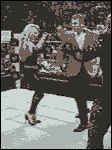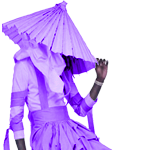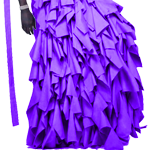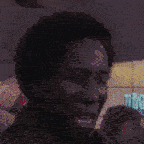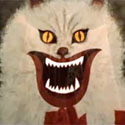|
I'm actually curious what a life of an attractive or a very attractive man is like. I'll refer to one as "Chad" for the sake of simplicity, but you could be any race (if it matters). - What's your mindset like? People say "confident." I suspect this is a mindset of abundance... an assurance that there's enough in the world, an assurance that you are fine now and that you'll be fine in the future. - What are the costs of being a Chad? Do you get lonely because girls see you as a concept and not as a real human? Do you have to stay disciplined to stay in shape and keep your mind sharp? What's your schedule like? - What are the benefits? Sex obviously. What else? - Do you think being a Chad is inherent (born that way), or is it something you can work for? Were you ever unattractive, and can you tell the difference in quality of life? Things like that. I'm looking to get a bit deeper and find out things that people don't usually talk about. Appreciate any input.
|
|
|
|

|
| # ? Apr 23, 2024 20:15 |
|
My bro, its all about having the proper chaditude
|
|
|
|
Iíve had sex with more women than the Toronto guy lol
|
|
|
|
Pick posted:Iíve had sex with more women than the Toronto guy lol Wow Pick that's hot. How many women have you had sex with? Why don't I already know every detail of this rather than Hugh minutiae????
|
|
|
|
I lived in Wallya for about 13 weeks during Peace Corps training, and in Gadjira/Mongo as a volunteer for two years, from 1996 until 1998. What seemed typical for Chadians when I lived in both places was similar. The closer to the capital the more access to imported things, and the farther away, the more similar people were to one another (similar clothing, culture, language, etc.). I could expand almost anywhere here, but chose these small aspects of life to give a general idea of what it is like. I have sensational stories that describe how it "can be" but those are likely more typical for me as a white woman/American than as a real idea of what it is like to live there as a regular person. - The morning starts early, and breakfast for most is made over a three-stone fire pit, using wood or charcoal as fuel, or over a "ganoun" which is a small cone-shaped grate to hold charcoal, over which a pot can be placed. Breakfast could be rice porridge, millet dough with sauce or other foods, depending on the origin of the eater. Always there is tea (with or without milk) and always with sugar. Sometimes there are small donut-hole-like pastries ("beignets" or "cake") depending on the region. - In Wallya, most people walk to work and everywhere else, (and from Wallya, have to cross a one-lane bridge from which one can see hippos). From the bridge, one can also see people washing clothes or bathing in the river. Some people walked over the bridge and picked up a bus or taxi. There is an obvious presence of armed military on the bridge. Almost nobody owns a car or motorcycle. There are a few bicycles. - In the city, work could be anything from being a school teacher, to a church official, functionary, or seller in the market. There are leather-workers, butchers, and tea-makers, shoeshiners and taxi drivers in the city. Many of those going to work carry what they need for work on their heads (their chair, products they are selling, and also maybe have a child on their back). In the smaller village, everyone was pretty much a cultivator of the food they need, and participated in some form of micro- or macro-commerce (more rare) to supplement grain, rice, and peanut needs. - In the village, there are a few farmers who grow crops other than millet and sorghum, peanuts and rice. Some greens are gathered from trees (baby leaves), and from "en brousse" and some is bought in the market, including local cucumbers, spinach, lettuce, tomatoes, onions, garlic, and mangoes rounded out the widely available produce in the village. More rarely long, green beans, tiny bananas, and guavas were available. But expensive. Overall, green vegetables are scarce. - Most people work relatively long hours, since they have a late afternoon break, but live too far from home to walk there midday for a break. - Most people shop for a single day, lacking refrigeration in their home. This is either by going to the market in the capital during the day, or going to the evening market in Wallya. Women spend as wisely as possible. They compare notes on prices for things in the market daily. Shopkeepers give a "zigaygay", a small pinch of the product they are selling, as a gift, so you come back. - Most people either went to church (weekly) or mosque (daily and/or on Friday). There were a few followers of animist beliefs. - Houses were mostly made of mud, but some were cement blocks. Most had either mud, grass/straw or corrugated metal roofs. Most houses were surrounded by tall mud walls for protection (from animals or other people). - Many homes had extended family living there (either who were attending school, had deceased relatives or those too poor to care for them, or who had some other reason (often employment) for being near the capital or the town center. - Kids (at least in the households where I lived) took school lessons VERY seriously. Their family members (often older siblings) helped them with their lessons. Kids were very playful, smiling, have home-made games. Almost every one seems to play soccer with more talent than I. - There are no sidewalks and nearly no pavement except for the main road going through town (to Cameroon). - Food available varies from very limited in the hot season, to less limited during the harvest season. As a land-locked country, Chad has some limits on what it is able to import, and the price of imported items is really high (higher than most people can afford). - Shoppers had to purchase plastic bags, which were smuggled from Cameroon. Most people used home-made fiber bags, either that they made or that they purchased from someone who makes them by hand. They are much more durable (and pretty). - Women are mostly dressed in long, colorful cloth wraps they call "lafai" or a shorter wrap called a "pagna", or in waxed or non-waxed cloth clothing, made by a tailor. Color rules in women's clothes. There are prints that celebrate special events, women's groups, and cell phones. - Men are mostly dressed in either slacks/pants and button down or t-shirts, OR in long combos consisting of long, baggy drawstrings pants and a long sleeved, very long shirt. These are made of matching, usually light-colored fabric. Dress for men and women was typically based on their region of origin. - The day goes from sun-up (or earlier, usually for the family breakfast-makers) to sun-down (or later as the family may sit around a petrol lamp and chat before retiring. Electricity was not yet out to Wallya when I was there, but may have been extended there by now. People used petrol lamps to see at night. - Mostly, when relaxing, people sit and lie on mats made of woven plant material, or woven plastic, which keeps out the wet in the rainy season, and these are rolled up and put inside or under cover at night. Many people sleep on them, if they lack a mattress. Some people have chairs or benches. These also are put inside at night even if the house is surrounded by a high wall. There is fear of theft. - People are busy working during a lot of their time. People spend a lot of time talking and connecting while doing the jobs of life. - People have to bring water to their home from a well if they do not have one. Some neighbors share. Donkeys or water carts bring water for cooking and washing for a small cost. - Travel outside the village is rare, especially for women and children. I met many, many adult women who had never left their small village, or perhaps a 10-mile radius from where they were born, and this all on foot. When people did travel, it was almost always by "market truck", which involved a high cost (for the average person), and a place atop a truck and bags of millet, chicken baskets, other products for sale making transit, and lots of other people. It involved lots of waiting, and mechanical breakdowns, and travel over a few precarious overpasses made of old truck chassis' and wood or logs laid across them. If night fell and the driver was tired, he just stopped and you made a place to sleep (or hang out awake) in the sand. When I traveled, I was almost always looked after by another woman who kept her eye on me to make sure I did not get harassed. This was usually communicated to me with a look, at first, and then maybe bringing me something from a food vendor when we stopped briefly. I watched some amazing mechanical talent when traveling in Chad.
|
|
|
|
Chad is more than just a perfect looking and popular star athlete. His soul must be untouchably Chad , as well.
|
|
|
|
Oppressed by the Chadriarchy
|
|
|
|
china bot posted:I lived in Wallya for about 13 weeks during Peace Corps training, and in Gadjira/Mongo as a volunteer for two years, from 1996 until 1998. What seemed typical for Chadians when I lived in both places was similar. The closer to the capital the more access to imported things, and the farther away, the more similar people were to one another (similar clothing, culture, language, etc.). I could expand almost anywhere here, but chose these small aspects of life to give a general idea of what it is like. I have sensational stories that describe how it "can be" but those are likely more typical for me as a white woman/American than as a real idea of what it is like to live there as a regular person. 
|
|
|
|
Spinster posted:Wow Pick that's hot. How many women have you had sex with? Why don't I already know every detail of this rather than Hugh minutiae???? I have only had long term relationships with women.
|
|
|
|
Pick posted:I have only had long term relationships with women. Jfc.
|
|
|
|
Lol if you think a Chad would be on something awful At best we are internet Chad's in comparison to redditors, but that's about it
|
|
|
|
Well, you see... wait, you said Chad, not Brad. Hmm, nevermind.
|
|
|
|
I'm a Tanner. Can I provide any insight?
|
|
|
|
china bot posted:I lived in Wallya for about 13 weeks during Peace Corps training, and in Gadjira/Mongo as a volunteer for two years, from 1996 until 1998. What seemed typical for Chadians when I lived in both places was similar. The closer to the capital the more access to imported things, and the farther away, the more similar people were to one another (similar clothing, culture, language, etc.). I could expand almost anywhere here, but chose these small aspects of life to give a general idea of what it is like. I have sensational stories that describe how it "can be" but those are likely more typical for me as a white woman/American than as a real idea of what it is like to live there as a regular person. same
|
|
|
|
Chad The name Chad is a baby boy name. Anglo-Saxon Meaning: The name Chad is an Anglo-Saxon baby name. In Anglo-Saxon the meaning of the name Chad is: Name of a saint. Celtic Meaning: The name Chad is a Celtic baby name. In Celtic the meaning of the name Chad is: Defence. English Meaning: The name Chad is an English baby name. In English the meaning of the name Chad is: Protector; defender. English form of a Welsh name meaning battle or warring. Famous bearer: 7th- century bishop St Chad founded the Samaritans, a charitable organization providing service for the suicidal and despairing. Numerology SoulUrge Number: 1 People with this name have a deep inner desire to use their abilities in leadership, and to have personal independence. They would rather focus on large, important issues, and delegate the details. Expression Number: 7 People with this name are excellent at analyzing, understanding, and learning. They tend to be mystics, philosophers, scholars, and teachers. Because they live so much in the mind, they tend to be quiet and introspective, and are usually introverts. When presented with issues, they will see the larger picture. Their solitary thoughtfulness and analysis of people and world events may make them seem aloof, and sometimes even melancholy.  
|
|
|
|
 pic of me being huddled and protected by Chad(s) from this unChad and evil world 
|
|
|
|
Chads are too busy slaying puss to use the internet, dummy.
|
|
|
|
My husband is hot. You want me to ask him?
|
|
|
|
Lacey posted:My husband What a cuck.
|
|
|
|
Spinster posted:Jfc. Men are for procreation and labor not love. Except Chad.
|
|
|
|
i like that posted:Chad what the gently caress is a soulurge number?
|
|
|
|
OP there are a series of diagrams describing what you seek, google should prove helpful.
|
|
|
|
pap smear posted:what the gently caress is a soulurge number? you're clearly not a chad
|
|
|
|

|
|
|
|
Halser posted:you're clearly not a chad Oh no, you've figured me out. I'm no Chad... I'm a.... Brad
|
|
|
|
i like that posted:Men are for procreation and labor not love. Except Chad. No one is entitled to or deserving of love, overall people are bad and we should all die
|
|
|
|
soggy twat flaps is a pro username
|
|
|
|
deifnitely not a chad, but i am a total slut
|
|
|
|
Every chadurday I take the condom off my dick and go a'fuckin OP
|
|
|
|
Literally A Person posted:What a cuck. sorry I'm just not interested
|
|
|
|
Lacey posted:sorry I'm just not interested Oh, no no. I was just trying to go by the writings:  And if you cope you're either a normie, a cuck, or a normie cuck. Listen, I didn't make these rules up. I just follow them.
|
|
|
|
pap smear posted:what the gently caress is a soulurge number? What do they even teach in schools these days? quote:What is the Soul Urge Number? So like, pap smear 1 6 1+6 = 7 Soul Urge Number 7: People with a 7 soul urge are quiet and introspective. They are driven by a need for deeper understanding and are often philosophical by nature. I guess you did ask...
|
|
|
|
pap smear posted:Oh no, you've figured me out. I'm no Chad... I'm a.... Brad As a vlad my life consists mainly of swooping down on unsuspecting virgins and drinking their blood, pronouncing "blood" in ever more ridiculous ways, and interior decoration. It's pretty hard to tell who's a virgin these days, and if I eat someone who isn't one, I get these terrible seizures and vomit it all up. It's awful. That's why I use threads like these to find fresh incels to feast upon.
|
|
|
|
Tolkien minority posted:No one is entitled to or deserving of love, overall people are bad and we should all die Give your heart to Jesus cuz no one earthly deserves it or will treat it properly! The subject of this thread is an appropriate earthly alternative, though.
|
|
|
|

|
|
|
|
Spinster posted:Jfc. Hugh was my chance to be straight
|
|
|
|
Pick posted:chance to be straight Sister, with the state of masculinity in this society...consider yourself lucky.
|
|
|
|
I'd describe it but a non-Chad mind wouldn't be able to comprehend.
|
|
|
|
It's p cool op but sometimes my dick gets tired thanks for asking.
|
|
|
|

|
| # ? Apr 23, 2024 20:15 |
|
Pick posted:Hugh was my chance to be straight Any man take takes you out of the heterosexual dating pool is a man doing god's work. Let's all pour one out for our guy hugh.
|
|
|










